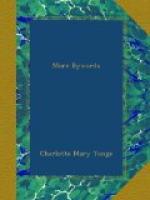The sun grew hotter and hotter, Bertram’s wound bled, though not profusely, the smart grew upon him, his tongue was parched with thirst, and though he kept resolutely on, his breath came panting, his head grew dizzy, his eyes dim, his feet faltered, and at last, just as he attained a wider and more trodden way, he dropped insensible by the side of the path, his dry lips trying to utter the cry, “Lord, have mercy on me!”
II. DE JURE
When Bertram de Maisonforte opened his eyes again cold waters were on his face, wine was moistening his lips, the burning of his wound was assuaged by cooling oil, while a bandage was being applied, and he was supported on a breast and in arms, clad indeed in a hauberk, but as tenderly kind as the full deep voice that spoke in English, “He comes round. How now, my child?”
“Father,” murmured Bertram, with dreamy senses.
“Better now; another sup from the flask, David,” again said the kind voice, and looking up, he became aware of the beautiful benignant face, deep blue eyes, and long light locks of the man in early middle age who had laid him on his knee, while a priest was binding his arm, and a fair and graceful boy, a little younger than himself, was standing by with the flask of wine in his hand, and a face of such girlish beauty that as he knelt to hold the wine to his lips, Bertram asked—
“Am I among the Angels?”
“Not yet,” said the elder man. “Art thou near thine home?”
“Alack! I have no home, kind sir,” said Bertram, now able to raise himself and to perceive that he was in the midst of a small hand of armed men, such as every knight or noble necessarily carried about with him for protection. There was a standard with a dragon, and their leader himself was armed, all save his head, and, as Bertram saw, was a man of massive strength, noble stature, and kingly appearance.
“What shall we do for thee?” he asked. “Who hath put thee in this evil case?”
Bertram gave his name, and at its Norman sound there was a start of repulsion from the boy. “French after all!” he exclaimed.
“Nay, David,” said the leader, “if I mind me rightly, the Lady Elftrud of Boyatt wedded a brave Norman of that name. Art thou her son? I see something of her face, and thou hast an English tongue.”
“I am; I am her only son!” exclaimed Bertram; and as he told of his wrongs and the usage he had met with, young David cried out with indignation—
“Uncle, uncle, how canst thou suffer that these things should be? Here are our faithful cnihts. Let us ride to the forest. Wherefore should it not be with Red William and his ruffians as with Scottish Duncan and Donald?”
“Hush thee, David, my nephew. Thou knowest that may not be. But for thee, young Bertram, we will see what can be done. Canst sit a horse now?”
“Yea, my lord, full well. I know not what came over me, even now,” said Bertram, much ashamed of the condition in which he had been found.




